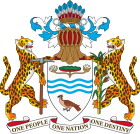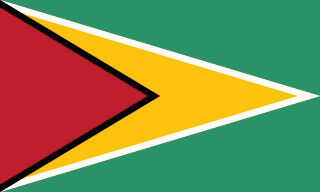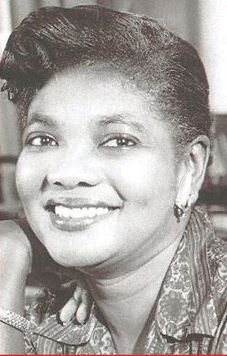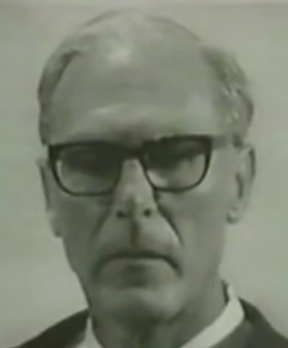 |
|---|
| Constitution |
The National Democratic Party (NDP) was a political party in British Guiana led by Rudy Kendall.
 |
|---|
| Constitution |
The National Democratic Party (NDP) was a political party in British Guiana led by Rudy Kendall.
The NDP was created as a spin-off from the League of Coloured Peoples (LCP). [1] The party contested 15 of the 24 constituencies in the 1953 general elections, and was backed by the media, as well as the LCP, the Manpower Citizens' Association and other trade unions. Its support base was largely among the middle-class Afro-Guyanese population, although it also had some middle-class Indo-Guyanese and Portuguese members, including Lionel Luckhoo. [1] [2] Prior to the elections, two splinter groups left the party to form the People's National Party and the United Guiana Party. [2]
The elections saw the party receive 13% of the vote, winning only two of the 24 seats in the House of Assembly, taken by Kendall (who won in New Amsterdam) and Eugene Francis Correia (Bartica and Interior). [3]
In 1955 the party merged into the new United Democratic Party. [4]
Politics of Saint Vincent and the Grenadines takes place in the framework of a parliamentary democracy. Saint Vincent and the Grenadines is an independent Commonwealth realm, with Charles III as its king, represented by a governor-general, who acts on the advice of the prime minister and the cabinet. The prime minister is the leader of the majority party of the House of Assembly, and the cabinet conducts affairs of state. The governor-general exercises ceremonial functions, but reserve powers, under the Saint Vincent and the Grenadines constitution, can be used at the governor-general's discretion.
The history of Guyana begins about 35,000 years ago with the arrival of humans coming from Eurasia. These migrants became the Carib and Arawak tribes, who met Alonso de Ojeda's first expedition from Spain in 1499 at the Essequibo River. In the ensuing colonial era, Guyana's government was defined by the successive policies of Spanish, French, Dutch, and British settlers. During the colonial period, Guyana's economy was focused on plantation agriculture, which initially depended on slave labor. Guyana saw major slave rebellions in 1763 and 1823. Following the Slavery Abolition Act of 1833, 800,000 enslaved Africans in the Caribbean and South Africa were freed, resulting in plantations contracting indentured workers, mainly from India. Eventually, these Indians joined forces with Afro-Guyanese descendants of slaves to demand equal rights in government and society. After the Second World War, the British Empire pursued policy decolonization of its overseas territories, with independence granted to British Guiana on May 26, 1966. Following independence, Forbes Burnham rose to power, quickly becoming an authoritarian leader, pledging to bring socialism to Guyana. His power began to weaken following international attention brought to Guyana in wake of the Jonestown mass murder suicide in 1978.

British Guiana was a British colony, part of the mainland British West Indies, which resides on the northern coast of South America. Since 1966 it has been known as the independent nation of Guyana.

Cheddi Berret Jagan was a Guyanese politician and dentist who was first elected Chief Minister in 1953 and later Premier of British Guiana from 1961 to 1964. He later served as President of Guyana from 1992 to his death in 1997. In 1953, he became the first Hindu and person of Indian descent to be a head of government outside of the Indian subcontinent.

Hugh Desmond Hoyte was a Guyanese politician who served as Prime Minister of Guyana from 1984 to 1985 and President of Guyana from 1985 until 1992.

Linden Forbes Sampson Burnham was a Guyanese politician and the leader of the Co-operative Republic of Guyana from 1964 until his death in 1985. He served as Premier of British Guiana from 1964 to 1966, Prime Minister of Guyana from 1964 to 1980 and then as the first Executive President of Guyana from 1980 to 1985. He is often regarded as a strongman who embraced his own version of socialism.

The People's Progressive Party/Civic (PPP/C) is a major political party in Guyana. As of 2020, the party holds 33 of the 65 seats in the National Assembly and forms the government. It has been the ruling party in the past as well, most recently between 1992 and 2015. In Guyana's ethnically divided political landscape, the PPP/C is a multi-ethnic organization that is supported primarily by Indo-Guyanese people.
Eusi Kwayana, formerly Sydney King, is a Guyanese politician. A cabinet minister in the People's Progressive Party (PPP) government of 1953, he was detained by the British Army in 1954. Later he left the PPP to form ASCRIA, a Pan-Africanist grassroots political group that, after a brief flirtation with the People's National Congress (PNC) of Forbes Burnham, fused into the Working People's Alliance (WPA). Kwayana is also a playwright.
Afro-Guyanese are generally descended from the enslaved people brought to Guyana from the coast of West Africa to work on sugar plantations during the era of the Atlantic slave trade. Coming from a wide array of backgrounds and enduring conditions that severely constrained their ability to preserve their respective cultural traditions contributed to the adoption of Christianity and the values of British colonists.

Guyana, officially the Co-operative Republic of Guyana, is a country on the northern mainland of South America. Guyana is an indigenous word which means "Land of Many Waters". The capital city is Georgetown. Guyana is bordered by the Atlantic Ocean to the north, Brazil to the south and southwest, Venezuela to the west, and Suriname to the east. With a land area of 215,000 km2 (83,000 sq mi), Guyana is the third-smallest sovereign state by area in mainland South America after Uruguay and Suriname, and is the second-least populous sovereign state in South America after Suriname; it is also one of the least densely populated countries on Earth. It has a wide variety of natural habitats and very high biodiversity.

The people of Guyana, or Guyanese, come from a wide array of backgrounds and cultures including aboriginal natives, and African origins, as well as a minority of Chinese and European descendant peoples. Demographics as of 2012 are Afro-Guyanese 39.8%, Indo-Guyanese 30.1%, mixed race 19.9%, Amerindian 10.5%, other 1.5%. As a result, Guyanese do not equate their nationality with race and ethnicity, but with citizenship. Although citizens make up the majority of Guyanese, there is a substantial number of Guyanese expatriates, dual citizens and descendants living worldwide, chiefly elsewhere in the Anglosphere.

The Constitution of Guyana is the highest governing document in the Republic of Guyana. It came into effect on October 6, 1980, replacing the constitution enacted in 1966 upon its independence from the United Kingdom. The current Constitution of Guyana contains 12 chapters that are further divided into 232 articles. It also contains a preamble and an oath. Since its 1980 enactment, it has gone through multiple amendments.

General elections were held in British Guiana on 27 April 1953. They were the first held under universal suffrage and resulted in a victory for the People's Progressive Party (PPP), which won 18 of the 24 seats in the new House of Assembly. Its leader, Cheddi Jagan, became Prime Minister.

The National Labour Front (NLF) was a political party in Guyana.

Women in Guyana are a cross-section of Asian, African, and indigenous backgrounds. British colonization and imperialism have contributed to the sexism against Guyanese women in the household, politics, and education.

The Manpower Citizens' Association was a trade union and political party in British Guiana.

The United Democratic Party (UDP) was a political party in British Guiana led by John Carter.

Jane Phillips-GayCCH was an Afro-Guyanese trade unionist and an ordained minister. She was an advocate of women's rights, formed one of the first women's political organizations in the country and served as one of the first women to be elected as a Member of British Guiana Parliament. She was recognized with the national service honor, the Cacique Crown of Honor in 1975.

Winifred Gaskin, CCH, OD was an Afro-Guyanese educator, journalist and civil servant who entered politics. After a career in public service, she was appointed as the first high commissioner of Guyana to the Commonwealth Caribbean Countries organization. Her dedication to public service was honored with the Jamaican Order of Distinction and the Cacique's Crown of Honour, Guyana's second highest service award.

Peter Stanislaus D'Aguiar was a Guyanese-Portuguese businessman, conservative politician, and minister of finance from 1964 to 1967.